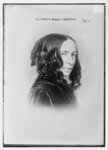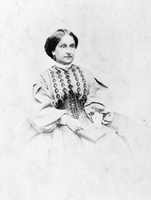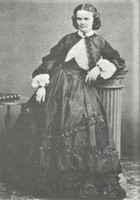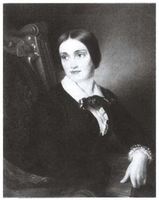Letter from Elizabeth Barret Browning to Isa Blagden, Dec 12, [1858]
Dublin Core
Title
Subject
Description
Credit
The Brownings CorrespondenceCreator
Source
Publisher
Date
Type
Letter Item Type Metadata
Text
My dearest Isa,
here we are in Rome, and in our old quarters of the Lion’s jaws: they have devoured us as usual. Do you congratulate or condole with us? Never mind: I will think rather of you, dear dear Isa, & how you have safely arrived at your journey’s end, & seem to envisage Madrid with no despondency. What most I am sorry for is your report of carriages, as this expense may interfere somewhat in your enjoyment of air & out-door amusement. Let it do so as little as possible, dear, so that you may bring back with you a sack full of reminiscences for books & “articles” & Casa Guidi fireside. Remember in time, now, that whatever you neglect seeing you will regret hereafter. Meanwhile you have the pleasure of giving pleasure—which is the greatest (in kind) possible to your generous nature.
We had a delightful journey from Florence hither– The weather broke up as you left us, & we removed from our Tuscany in a flood of sunshine. Seven days of pleasant travelling therefore, with the exception of a little sprinkling during two of them; & no cold at all, so that I could enjoy scenery & change to the uttermost. The Eckleys were kind beyond kindness. Our carriage was perfectly comfortable,—& I had Heine in it to give the right touch of rapture now & then. Anunziata travelled on the outside, & Ferdinando took all our luggage by sea .. except a couple of carpet-bags. At the end of the seven days I had finished my volume of Heine in time for the sight of St Peters. (And that Spanish ballad about the Jew was in it!) In the streets of Rome we met Ferdinando wildly roving, with a list of apartments sent by Annette. Only one except the Bocca di Leone would have suited us, but we had to go to Via di Ripetti for it, & when we arrived there I took fright at the neighbourhood of the Tiber, so we went to the hotel d’Angleterre & brooded over events till morning. Then, off we came to our Lion’s mouth, & have congratulated ourselves on it ever since. Only fifty scudi a month, & newly decorated .. with scarlet portiere & fresh carpets,—& a blazing sunshine that has never worn out to want renewing: it is very cheerful & very comfortable. The drawback is the size of the salon—but I shall not pine after “receptions”. The Storys have been to see us: indeed they passed one evening here. She is less pretty through having increased her scale. I understand she undresses a good deal, but I have not seen it so. He was great on the spirit-question—ending his “account of broken boxes” (viz tables) by doubting as to the spirituality of the cause: he did not know, was not sure. Still, the fact is that he was terrified away from further investigations. Edith is a nice intelligent looking girl of fourteen,—& the youngest child very pretty. The first place we went to, was Mr Page’s studio. He & his new wife are living there at present—in the studio, I mean: but it wont answer for three I should think, & three will be there soon. The daughters are independently disposed of--Emma, who has returned from Mrs Tappan, lives with Mdme Fontana [sic], & they both came to pay me a visit, the latter looking as unpleasant as she used to do. The other married daughter has been dangerously ill from a miscarriage. The third Mrs Page is undeniably plain, of a coarse ungainly make & features, but very gentle & soft in manners & voice, & evidently on her knees before her husband in a chronic state of adoration. I think it is this which has bewitched him. “Will you teach me so & so? did you teach me so & so? is it so & so that you mean to teach me?” That’s the head & front of her talk to him. She is a young woman (which I was not prepared for) & of a healthy rose-coloured complexion– Her intelligence arrives, I suppose, at comprehending Page,—but otherwise it is not strikingly apparent. He calls himself “the happiest married man alive”, & really looks so. At last,—poor Mr Page. I shall respect her if she makes him happy– A repetition of his Venus is in the studio, almost ready for going to Paris in the spring. The body is of exquisite & not unchaste beauty, the shadows on the limbs wonderful, but the face has an undeniably meretricious expression which interprets the whole picture to its disadvantage. Still as a work of art, it is very fine. The artist is strong in Swedenborg & spiritualism, & I like him as well as ever. Mrs Story has tired of sitting for her picture, so leaves it on his hands–There’s human gratitude for you! Page told us, because we asked, but he told it quietly & with as little temper as possible.
Mr & Mrs Thompson have been here too– He is mild as milk. Both enquire after you——as Mr Hooker did, let me remember to say,—& Hatty & Gibson of course. Hatty looked radiant when I saw her. She came in one evening after dining with Pantaleoni, with large sleeves, & lace, & everything pretty. She remains Hatty after all. The night before she had been with Miss Cushman, & returning home at ten was encountered by a man who extended his arms & enquired why, she walked the streets of Rome at so late an hour– It was close to her own door, & she knocked before she spoke. Then turning round she said .. “You ask my reason for walking so late. This is my reason–” And crash across his face she struck with her iron-pointed umbrella. He turned & fled like a man—I wont say as Miss Cushman did, like an Italian. So there’s your Hatty for you.
What I admire more is her monumental figure which we went to the church to see–I assure you, Isa, it is exquisite. The pose,—the doubt between life & death,—the relaxation of the fingers .. from between which the rosary (the last hope) has fallen—the simplicity & pathos altogether, make it most impressive. Not merely her best work, but a work far better than I, for one, ever expected from her. Robert is greatly pleased– She is removing from Gibson’s studio. We saw the Puck,—& the Will o’ the Wisp which pleases me much less than the Puck. Zenobia is not in seeing order, but she means, she says, to be great in it. Since our visit to her works we have not seen Hatty, & I hear she is suffering from a boil or two again—poor Hatty.
The Sartoris’s dont come this winter, though Leighton is here. Rome is full, & to be fuller: & prices are enormous. The Brackens live a good way off from us as you know, but Robert sees Annette at Mrs Mackenzie’s studio where he goes to draw twice a week. Also she comes here sometimes,—& she & her uncle & Mrs Mackenzie, are to spend the evening with us tomorrow, for instance. Annette was wondering & complaining two days ago when she called here, at your not writing to her– Mr Bracken has your letter since. I think Mrs Mackenzie looking much better.
Robert is extremely well, & people cry out at the prosperity of his appearance. He goes out to walk every morning before breakfast with Mr Eckley—though the Eckleys are away by the porta Pinciana. The weather is damp but not cold, and I am well.
I wont say again that you should have come to Rome. Perhaps you should’nt—as you are at Madrid.
I go nowhere in the evening,—nor have been out even in the morning these three days. Still it is plain that I shall be freer to go out here than at my Florence. You will be sorry to hear that Una Hawthorne has been very ill with Roman fever (three attacks she has had) & that Franco is attending her. Mrs Hawthorne also is unwell. He of the Scarlet Letter came to see me some days ago, and I saw him for the first time in an anguish of shyness.
Is not this a heap of news? Am I at Rome for nothing? Dearest dear Isa, think of me, love me, write to me, & tell me all details about yourself. I long to hear. Robert’s true love with that of your true & tender Ba–





